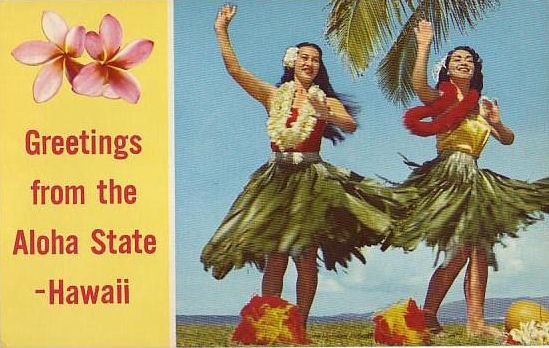Part 2
To many people, Hawaii is that magical land where clothing is optional, the sun always shines and the most difficult part of your day is deciding on which beach to visit. The trees are thick with all sorts of fresh, exotic fruit, the sea teems with every type of delicious fish imaginable. The people who live there have nothing to do but weave hats from pandanus leaves and sip drinks from coconuts with a straw. Everyone is tanned and healthy, there is rarely any crime and shoes are those things that horses wear. Well, that may have been true 40 years ago, but things have since changed.
Back then, aloha was something that just happened. It was there when you went to the local bakery for a dougnut and they gave you a half dozen malasadas to take home to your grandmother because they accidentally made extra and were her favorite. Or, when your neighbor gave you a few bags of smoked meat or opihi because they knew that you liked to serve delicious pupus during Monday Night Football. But aloha wasn’t only about giving and receiving, it was also about family and unity. Aloha was the foundation on which every Hawaiian built his or her character.
Now, it has become a rare commodity.
I live in the town where my mother grew up. It’s still a small speck of houses, at the end of the road on the Northern tip of the island. People wave at one another when they pass on the road. Everyone knows what everyone is else is doing (or think that they know, at any rate). Sure people smile, and for the most part are not rude to one another, but this is not aloha.
Most people who’ve move here or those who have come here on vacation have no idea that this bastardized aloha is not the genuine article. There would be no way for them to know. To most transplants, aloha is the fact that the big moke at the beach didn’t kick your butt or call you a racial slur, when you accidentally stepped on his luau feet. Or, that the check out girl at the grocery store called you uncle or aunty, which could be construed as a affectionate term, but in reality, was said because she forgot your name. To the untrained eye, aloha is alive. Maybe not well, but alive still the same.
The unfortunate truth is that aloha is dead. It has been for some time. Just when this tragedy occurred is not clear, but I imagine that the death throes began somewhere around the time that I was born. More specifically, around the time that the plantations began closing and the the hotel industry began to flourish.
At the middle of the last century, Hawaii was no longer viewed as simply another island outpost, run rampant with godless natives that needed to be whipped into shape, modernized and educated. It had become of strategic interest to many different countries who had already established themselves there. The logging industry and whaling industry had come and were on their collective way out. There needed to be another form of industry that could capitalize on the temperate climate and cheap labor force that Hawaii had to offer.
Enter the plantations. Sugar cane became the new king.
There were 5 main sugar plantation companies, all eager to ride their cash cows into the sunset. During the mid 1800’s the workers began to organize, demanding more pay and better working conditions. The plantations owners responded by getting rid of those upstarts and bringing in a new labor force from various Asian and European countries. Chinese, Japanese, Filipino, Puerto Rican and Portuguese were brought in by the boat load to harvest Hawaiian sugar cane. Whenever one ethnicity began complaining about wages and working conditions they were replaced by another.
I won’t get into the politics or fallout of such practices, but I will say that during this time Hawaii began to undergo a transformation that put it on track to becoming the racially diverse melting pot that it is today. It is also important to mention that during the assimilation of those various ethnicities into Hawaiian society, those immigrants were educated about the importance of preserving the endemic island culture. Children were taught about Hawaiian history in school, they learned the language (to a certain degree), and while retaining their own heritage, began to adopt the Hawaiian spirit as an extension of their own. The idea of aloha, of having and sharing love for the land and the people was sustained despite the radically different origins of those new immigrants.
My grandparents generation lived and practiced aloha; I see it in the way that their generation interacts with one another. There is a certain harmony that guides them, an unspoken kindness and affability that is not so common in subsequent generations.
They are the last, the keepers of the flame. When they all pass away, so will what remains of the true spirit of aloha.
But why? What caused this decline?
The answer is as simple as it is complex, but in a nutshell it had to do with trading happiness with happiness and more importantly just trying to survive.

